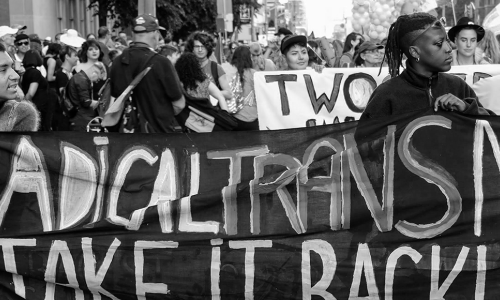Stephen M. Gardiner on the “Pittsburgh, not Paris” smokescreen
On June 1st, President Donald Trump announced the United States’ withdrawal from the Paris Agreement. The decision reflected the strong anti-climate stance of the new Administration. On the campaign trail, candidate Trump persistently denied the reality of global climate change, at one point calling it a “hoax” perpetrated by the Chinese. As President, he has already abandoned key elements of the Obama Administration’s strategy for reducing US carbon emissions (e.g., the Clean Power Plan), and appointed well-known climate deniers to his administration, including to the leadership of the US Environmental Protection Agency. More generally, from inauguration day onwards, the Trump Administration has declared its intention to pursue an aggressive expansion of fossil fuel use.
In his announcement Trump cited two main reasons for US withdrawal from Paris: that the agreement was unfair to the United States; and that he was “elected President of Pittsburgh, not Paris”. The complaint about fairness is difficult to sustain. First, it is unreasonable as a matter of substance. It is well-known that the current Paris commitments are inadequate, and must be significantly enhanced to meet the stated goal of avoiding “dangerous anthropogenic interference” with the climate system (understood in terms of the 2 degrees Celsius threshold). Moreover, all of the main indicators relevant to fairness (historical responsibility, ability to pay, prioritising the least well-off, and promoting welfare) tend to point strongly in the direction of rich, high-emitting countries such as the United States taking the lead, and to a much greater extent than suggested under Paris. Hence, appropriately ambitious climate goals would demand more of the US, not less.
Second, as a matter of procedure, it is deeply misleading to speak as if the United States’ obligations were somehow imposed by outsiders. All Paris commitments are voluntary, and determined domestically by national governments, including the United States’ contribution. Moreover, the whole architecture was largely designed by the US to meet its own goals and internal constraints.
The President’s denial of responsibility is equally problematic. Most obviously, it appears to presuppose that national leaders have no duties to other nations, even in cases where their behaviour poses severe threats to very many (perhaps billions) of noncitizens, including of extreme suffering, starvation and death.
The denial also presents a false dichotomy. The “Pittsburgh, not Paris” slogan implies that the President sees himself as acting in the US national interest. Yet the Paris process aims to avoid the risk of increases in global temperature of similar magnitude to previous Ice Age shifts (4-6 degrees Celsius or more) that would be catastrophic for the United States as well as for other countries. Consequently, a President genuinely focused on the long-term, intergenerational interests of Pittsburgh, or the United States in general, would not allow the climate threat to develop further. If President Trump had chosen Miami or New Orleans or New York as examples, this would have been obvious. Miami, for example, cannot survive the sea level rise that will be brought on by a rapid rise in global temperatures.
Elsewhere I have argued that climate change is one instance of an underappreciated collective action problem that I call the tyranny of the contemporary. Since there are serious time-lags in the climate system, a significant part of the problem involves earlier generations taking short-term benefits for themselves while imposing severe and perhaps catastrophic harms on future generations. Such intergenerational buck-passing is ethically unconscionable. It also encourages a corruption of the discourse. There is a strong incentive for those who wish to engage in intergenerational buck-passing to cover up their behaviour with misleading framings.
Unfortunately, the “President of Pittsburgh” catch-phrase fits the bill nicely by encouraging a lazy myth that remains popular in some policy circles. The myth claims (explicitly) that national governments can be relied upon to act in the interests of their citizens, and (implicitly) that this is true intergenerationally, over decades and even centuries into the future. Both parts of the myth are dubious, but the implicit claim is peculiar to the point of absurdity. Unfortunately, this has not stopped it creeping into some philosophical analyses of climate change, often through the diagnosis that countries face a traditional tragedy of the commons or prisoner’s dilemma situation, under the implicit assumption that each country represents the interests of its citizens in perpetuity. (Sometimes the implicit assumption is masked by the tortured phrase “intergenerational prisoner’s dilemma”.) In my view, we should banish such absurdities and highlight the real threat posed by the tyranny of the contemporary to conventional political philosophy, political institutions, and perhaps to humanity itself. For instance, perhaps we should take the Pittsburgh President at his word – as insisting that his responsibilities are only to the very short-term – and emphasise that there is a serious governance gap when it comes to representing intergenerational concern. Elsewhere I propose that the first step in meeting this “democratic deficit” should be a global constitutional convention focused on future generations. President Trump’s recent decisions make taking that step even more urgent.
Stephen M. Gardiner is professor of philosophy and Ben Rabinowitz Endowed Professor of the Human Dimensions of the Environment at the University of Washington, Seattle, where he is also director of the program on values in society. He is the author of A Perfect Moral Storm, co-author of Debating Climate Ethics, editor of Virtue Ethics, Old and New, and co-editor of the Oxford Handbook of Environmental Ethics and Climate Ethics: Essential Readings.
You might also like...















